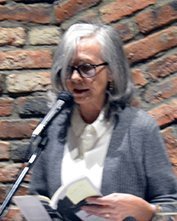
Launch of the Receiver
Readings by poets Sharon Thesen, Barry McKinnon and Greg Lainsbury brought together various sectors of the Prince George literary community at the Twisted Cork on Friday, Nov. 10th.
The event, organized by College of New Caledonia creative writing instructor Graham Pearce, and sponsored by the college, drew more than 100 listeners.
Prince George writer John Harris opened the event with an introduction of the poets, the importance of their work and the need for literary freedom. He emphasized the need to “keep poetry free of ideologies.”
Harris’s introduction is presented in full on this site.

My account is based on notes I took and is necessarily spotty, especially as regards the poetry read. Those interested in more detail might check the lines that caught my ear against the full texts that have already appeared or may now be available. Thesen read from her new book The Receiver, available from New Star Books. This book was on sale at intermission and at the reading’s end. McKinnon and Lainsbury read from published books but mostly from manuscripts and chapbooks. Some of the latter may be available from the poets.
McKinnon was the first reader. He said the inspiration for “The Organizer” came out of the Baldy Hughes DEW Line installation south-southwest of Prince George during the 1950s and 1960s.
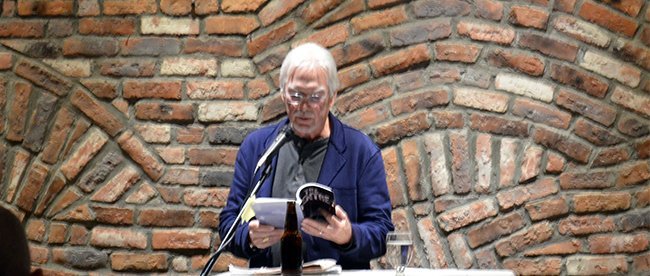
“I’m Jack Daw, the organizer,” he read from the poem, which was published in his Governor-General’s-nominated The the (Coach House 1980) “I wear elevator shoes. I’m responsible for everything.
“Who will see the last drunk home? You will, Jack. . . .
“Do you have your finger on the Nike Zeus?
“They chose you for no reason. But they knew you could do it.”
After reciting a second poem, McKinnon turned to reading an excerpt “Slab City,” about a makeshift community that grew up quickly in the southeastern California desert near the Salton Sea.
“They call it the last free city in America — a hobo camp,” McKinnon said by way of providing background for the poem.
“‘Freedom’ (unquote — is tolerance? or so I thot/
— in Slab City (in the range of
outliers, hobos, patriots, artists, tourists, military guys/
in camo, snowbirds, the neo whats? thus the guns, blasts at night into/
the dark hot air . . .
we are drawn to some sense of the end of the earth . . .
poverty — the hell of any desert / a place, a space marked/
out (tires, hubcaps, forms of grabage/garbage as set limits, vs. trespass/
. . . . a kind of oblivion. . .
What is reality? Only the figment of the imagination as it seeks itself? . . ./
do people die here? I’ve heard ambulances at night. . . . .
The Slab City poem reminded me of what Harris had said of about the poet as “the man on the dump.”
McKinnon observed, “I would write about my work” and the demands on a teacher while marking. Some of this writing appeared in his collection Pulp Log. “My work is displacement of time and energy,” he noted.
McKinnon wrote about “days in the life . . . . long talks over beer at O’Flaherty’s [former bar in the Coast Inn of the North].” He also described a swearing patron of the Columbus Hotel pub. “This is the drift into psychopathology.”
In a lighter moment McKinnon mentioned a student who won the lottery in the middle of a semester of his course. “I signed the withdrawal slip.” McKinnon had to realize that there was nothing meaningful keeping the student in his course, not the subject matter, and certainly not the instructor. I got the impression that, had he won a lottery, he would have quite the course — the college — himself.
“Here’s one more teaching poem:
“Partly through William Carlos Williams, the books close . . . ./
“The books will close. . . . We’ll see a future bleak and treeless.”
McKinnon drew approving laughter when he described current U.S. President Donald Trump as supposedly having been a creative writing student as a young man in 1975. The young D.J. Trump’s piece was titled “The End of the World!!!!!” An excerpt from the 200-word story, three hundred words short of the assigned 500 words, is as follows: “. . . The biggest cloud in the world, a great great deal and it’ll be great because I’ll tell you what, there’ll be no more deals, I mean it, with china, canada, mexico and a bunch of others . . . .”
Trump’s professor of the day gives him a C+, but encourages him with detailed suggestions for improving the story. These suggestion amount to a text that is five times longer than what the student Trump submitted. “I’m assuming ‘the cloud’ refers to the bomb, but this detail could be clearer. how big is the bomb? try thinking of a shape for the cloud. ‘mushroom’ comes to mind though it is a bit of a cliche (an overused word or description). Your story begins in medias res (in the middle of things) and I think this is a good way to begin a story like yours. . . .
“p.s and by the way, what a really really great title.. . . ”
Thesen read from The Receiver. She noted that she lived in Prince George from 1960 to 1964.
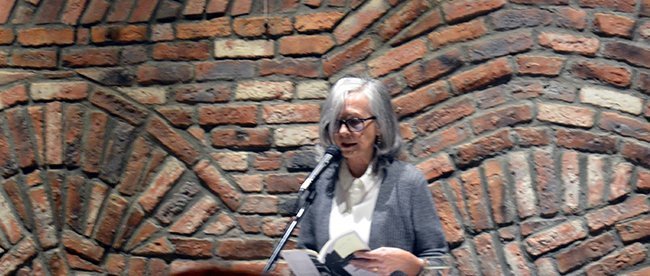
“Where you go through adolescence is ever after home,” she commented.
Thesen said she had also lived in Kamloops because her mother, who grew up in Masset on Haida Gwaii during the 1920s, received treatment for tuberculosis in the nearby Tranquille sanitarium.
“She spent time in Tranquille with Haida women she knew from home.”
The collection includes several poems about Thesen’s mother. One is, logically enough, titled “Another Poem for My Mother:
“. . . On the barge we passed dead towns . . . .”
The title from another is “Talking to My Mother on the Phone.” It recalls not only her mother’s stay in Tranquille but her roommate there who died young. Thesen draws in images from the work of early twentieth-century German writer Thomas Mann, his novel The Magic Mountain about a sanitarium in Central Europe. Thesen mentioned ‘a gold cure’ promoted by a Swiss sanitarium that involved injecting small amounts of gold molecules that were supposed to remove tuberculosis bacilli. This treatment was only of marginal utility.
The theme of Mann’s novel and her own poems was being in “a trapped condition on a mountain. . . .”
Then Thesen read “My Education As a Poet,” noting that most of it takes place in Prince George when she was 14:
“I knew we’d be in for a long night when Dad brought out the banjo. . . .
. . . .
Poetry — something out of whack . . . .
. . . .
Poetry, consumption . . . .
In the sanatarium Mom was homesick for fresh fish . . . .”
Greg Lainsbury read from his chapbook, Half Life:
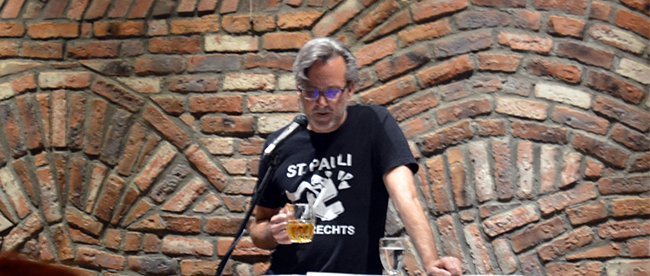
Every man is capable of . . . .
Why go on
I have nothing to say, but I’m saying it . . .
Possesses a bare winter landscape . . ..
Bemoans obstacles to intimacy . . .
Everything leads to what follows . . . .
. . . Party of animals, animals partying . . . .
There is no escape from heaven . . . .
Write as short as you can. . . .
Women edge away from the edge of hopelessness . . .
Cheap teenage nihilism . . .
Drug addicts with work ethics . . . .
When I have inspired universal disgust, I will have conquered solitude.
. . . Socially awkward — anxious and hostile”
Lainsbury emphasized a theme of betrayal of women.
The last section of the book is based in part on a quotation from Meister Eckhart:
“Everything has been tried . . .
He read another poem that turned on a quotation form Jean Jacques Rousseau:
“The gods have led me to great adventure. . . .”
At the end, there was a question-and-answer session. Barry McKinnon offered further background to “The End of the World,” by D.J. Trump.
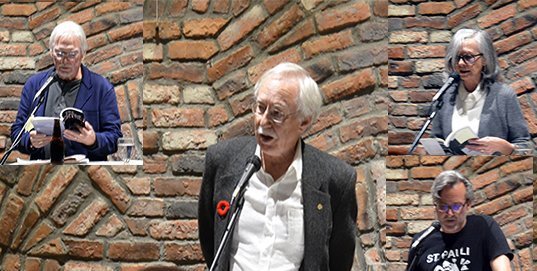
Thesen said that the refugees in Prince George of her day were called DPs, or displaced persons. Around 1961 her family’s neighbours were Danish, and the family was invited over for a smorgasbord and aquavit. The Danish immigrants said, “Here you’re free, you make money, it’s paradise.”
Thesen read more poems, including “Bird Bath” and “Pleasant Street.” Another poem was “found” in a Jan. 21, 2011 article in The Kelowna Courier about a seemingly intentionally too quick left-turn signal. “It’s a cash cow for the city.”
But she added, “But we are writing in our love of life and poetry.”
Lainsbury read from his chapbook Ever the Hypocrite. “Who lives up to all the rules all the time?” he said to an approving audience.
He answered questions about the process of composition, as did Thesen and McKinnon.
“Every landscape has its own way in a poem,” she advised. “Tonight, at this reading, I feel like I’m back home.”
She said North-Central British Columbia reminded her of Scandinavia or Whitehorse.
Thesen offered further observations on “My Education As a Poet.” It was inspired in part “by a desire for a sense of solidity or a sense of place. I will never really accomplish that.”
“Trouble is a great source for writing,” she concluded.
“Most of modern poetry talks about place,” McKinnon said, referring to William Carlos Williams. “It’s not just abrasive here,” McKinnon continued. “It’s the abrasiveness of the world. . . .And California, too.
“It’s our exile condition. Where am I? I’m in my head.”
Of Slab City residents he said, “They didn’t have a place: They claimed a place.”
Lainsbury said social media are a godsend for people living in isolated areas.
Of the concept of retirement, Thesen said, “It’s not a matter of time, but of energy.”
After the questions, people stayed for a half hour to discuss such topics as the role of poetry in the community and the impact of politics on the poetic art, among other things.
